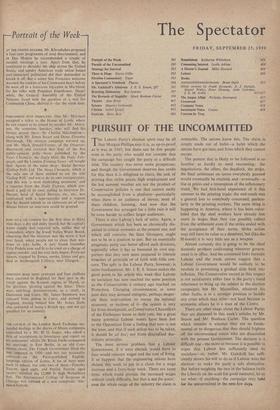PURSUIT OF THE UNCOMMITTED
rTHE Labour Party's election spirit may be all that Morgan Phillips says it is, as up-to-proof as it was in 1945; but there can be few people even in the party who would not concede that the campaign has caught the party at a difficult time. The country was never more prosperous; and though the Government deserves less credit for this than it is delighted to claim, the task of proving that stable prices, high employment and the hot summer weather are not the product 'of Conservative policies is one that cannot easily be accomplished from a platform—particularly when there is an audience of eleven, most of them children, listening. And now that the Government has arranged for a little rain it will he even harder to collect larger audiences.
There is also Labour's lack of unity. Again, a Government which has been so chronically dis- united at critical moments as the present one, and which still contains the Suez Groupers, ought not to be in a position to jeer. But an essentially pragmatic party can better afford such divisions, especially when it has so bemused its own sup- porters that they now seem prepared to tolerate broaches of principle or of faith with little con- cern. The split in the Labour Party, however, is more fundamental. Mr. J. E. S. Simon makes the good point in his article this week, that Labour on socialism has now reached the same position as the Conservatives a century ago reached on Protection. Changing circumstances at some later date may demand energetic, perhaps desper- ate State intervention to rescue the national economy, or sections of it—the system is very far from shockproof, as Conservative Chancellors of the Exchequer know to their cost; but a great many potential Labour voters have been lost to the Opposition from a feeling that now is not the time; and that if such action has to be taken, it should be ad hoc; not from discredited doc- trinaire principles.
The most serious problem • that a Labour Government, if it were elected, -would have to face would concern wages and the cost of living. It so happens that the engineering unions have chosen this week to put in a claim for a wage increase and a forty-hour week. There are some firms which could provide the increased wages without much difficulty, but that is not the point: over the whole range of the industry the claim is untenable. The unions know this. The claim is simply made out of habit—a habit which the unions have got into, and from which they cannot escape.
The pattern that is likely to be followed is so familiar as hardly to need recounting: the negotiations, the offers, the deadlock, the striice, the final settlement on terms everybody guessed would eventually be reached, and—eventually—a rise in prices and a resumption of the inflationary trend. We had first-hand experience of it this summer in the printing trade; the end-result was a general loss to everybody concerned, particu- larly to the printing workers. The same thing is happening in America, where it has been calcu- lated that the steel workers have already lost more in wages than they can possibly collect from the settlement even if the strike ended with the acceptance of their terms. Strike action may still have its value as a deterrent, but (like the H-bomb) it is very little use as a weapon.
Almost certainly this is going to be the chief domestic problem confronting whatever govern- ment is in office. And the continued links between Labour and the trade unions suggest that a Labour Government would be unlikely to be resolute in preventing a gradual slide back into inflation. The Conservative record in this respect is not satisfactory either (nor is the party's timid reluctance to bring up the subject in the election campaign); but Mr. Macmillan, whatever his other faults, is in a stronger position to handle any crisis which may arise—not least because in economic affairs he is a man of the Centre.
There are other snags about the Labour Party; they are discussed in this week's articles by Mr. Simon and Mr. Bonham Carter. The question which remains is whether they are so funda- mental or so dangerous that they should frighten off the uncommitted voters who are dissatisfied with the present Government. The decision is a difficult one—the more so because it is possible to argue that Labour has sufficiently shed its socialism—or, rather, Mr. Gaitskell has suffi- ciently shown his will to do so if Labour wins the election—to make the party a safe alternative. But before weighing the two in the balance (with the Liberals on the scale for good measure), let us see what—if anything—the campaign may hold for the uncommitted in the next few days.


































 Previous page
Previous page